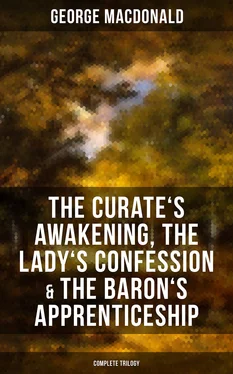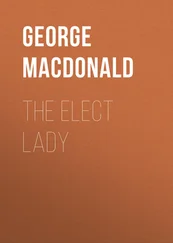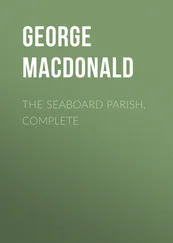"God forbid!" said Wingfold.
"I'm glad you don't think so, sir. I was afraid you would."
"Had the thing been a trifle, I should still have said the same," returned the curate. "But who with any heart would call it—a trifle to please the fancy of a poor woman, one who is probably far oftener vexed than pleased? She had been brooding over this dress—you took trouble to content her with her desire. Who knows what it may do for the growth of the woman? I know what you've done for me by the story of it."
"She did walk out pleased-like," said the draper, "—and left me more pleased than she,—and so grateful to her for coming—you can't think!"
"I begin to suspect," said the curate, after a pause, "that the common transactions of life are the most sacred channels for the spread of the heavenly leaven. There was ten times more of the divine in selling her that gown as you did, in the name of God, than in taking her into your pew and singing out of the same hymn-book with her."
"I should be glad to do that next though, if I had the chance," said Mr. Drew. "You must not think, because he has done me so little good, that our minister is not a faithful preacher; and, owing you more than heart can tell, sir, I like chapel better than church, and consider it nearer the right way. I don't mean to be a turncoat, and leave Drake for you, sir; I must give up my deaconship, but I won't my pew or my subscription."
"Quite right, Mr. Drew," said Wingfold; "that could do nothing but harm. I have just been reading what our Lord says about proselytizing. Good night."
Table of Contents
The curate had entered the draper's shop in the full blaze of sunset, but the demon of unbelief sat on his shoulders; he could get no nearer his heart, but that was enough to make of the "majestical roof fretted with golden fire .... a foul and pestilent congregation of vapours." When he left the shop, the sun was far below the horizon, and the glory had faded out of the west; but the demon had fled, and the brown feathers of the twilight were beautiful as the wings of the silver dove, sprung heavenwards from among the pots. And as he went he reasoned with himself—
"Either there is a God, and that God the perfect heart of truth and loveliness, or all poetry and art is but an unsown, unplanted, rootless flower, crowning a somewhat symmetrical heap of stones. The man who sees no beauty in its petals, finds no perfume in its breath, may well accord it the parentage of the stones; the man whose heart swells beholding it will be ready to think it has roots that reach below them."
The curate's search, it will be remarked, had already widened greatly the sphere of his doubts; but, the larger the field, the greater the chance of finding a marl-pit; and, if there be such a thing as truth, every fresh doubt is yet another finger-post pointing towards its dwelling.—So talked the curate to himself, and, full in the face, rounding the corner of a street, met George Bascombe.
The young barrister held out his large hospitable hand at the full length of his arm, and spread abroad his wide chest to greet him, and they went through the ceremony of shaking hands,—which, even in their case, I cannot judge so degrading and hypocritical as the Latin nations seem to consider it. Then Wingfold had the first word.
"I have not yet had an opportunity of thanking you for the great service you have done me," he said.
"I am glad to know I have such an honour; but—"
"I mean, in opening my eyes to my true position."
"Ah, my dear fellow! I was sure you only required to have your attention turned in the right direction. When—?—ah!—I—I was on the verge of committing the solecism of asking you when you thought of resigning. Ha! ha!"
"Not yet," replied Wingfold to the question thus at once withdrawn and put. "The more I look into the matter, the more reason I find for hoping it may be possible for me to—to—keep the appointment."
"Oh!"
"The further I inquire, the more am I convinced that, if not in a certain portion of what the church teaches, then nowhere else, and assuredly not in what you teach, shall I find anything by which life can either account for or justify itself."
"But if what you find is not true!" cried George, with a burst of semi-grand indignation.
"But if what I find should be true, even though you should never be able to see it!" returned the curate. And as if disjected by an explosion between them, the two men were ten paces asunder, each hurrying his own way.
"If I can't prove there is a God," said Wingfold to himself, "as little surely can he prove there is none."
But then came the thought—"The fellow will say that, there being no sign of a God, the burden of proof lies with me." And therewith he saw how useless it would be to discuss the question with any one who, not seeing him, had no desire to see him.
"No," he said, "my business is not to prove to any other man that there is a God, but to find him for myself. If I should find him, then will be time enough to think of showing him." And with that his thoughts turned from Bascombe, and went back to the draper.
When he reached home, he took out his sonnet, but, after working at it for a little while, he found that he must ease his heart by writing another. Here it is:
Methought that in a solemn church I stood.
Its marble acres, worn with knees and feet,
Lay spread from, door to door, from street to street.
Midway the form hung high upon the rood
Of him who gave his life to be our good;
Beyond, priests flitted, bowed, and murmured meet
Among the candles shining still and sweet.
Men came and went, and worshipped as they could,
And still their dust a woman with her broom,
Bowed to her work, kept sweeping to the door.
Then saw I, slow through all the pillared gloom,
Across the church a silent figure come;
"Daughter," it said, "thou sweepest well my floor!"
It is the Lord! I cried; and saw no more.
I suppose, if one could so stop the throat of the blossom-buried nightingale, that, though he might breathe at will, he could no longer sing, he would drop from his bough, and die of suppressed song. Perhaps some men so die—I do not know; it were better than to live, and to bore their friends with the insuppressible. But, however this may be, the man who can utter himself to his own joy in any of the forms of human expression—let him give thanks to God; and, if he give not his verses to the printer, he will probably have cause to give thanks again. To the man's self, the utterance is not the less invaluable. And so Wingfold found it.
He went out again, and into the churchyard, where he sat down on a stone.
"How strange," he said to himself, "that out of faith should have sprung that stone church! A poor little poem now and then is all that stands for mine—all that shows, that is! But my heart does sometimes burn, within me. If only I could be sure they were HIS words that set it burning!"
Table of Contents
"Mr. Wingfold," said Polwarth one evening, the usual salutations over, taking what he commonly left to his friend—the initiative,—"I want to tell you something I don't wish even Rachel to hear."
He led the way to his room, and the curate followed. Seated there, in the shadowy old attic, through the very walls of which the ivy grew, and into which, by the open window in the gable, from the infinite west, blew the evening air, carrying with it the precious scent of honeysuckle, to mingle with that of old books, Polwarth recounted and Wingfold listened to a strange adventure. The trees hid the sky, and the little human nest was dark around them.
"I am going to make a confidant of you, Mr. Wingfold," said the dwarf, with troubled face, and almost whispered word. "You will know how much I have already learned to trust you when I say that what I am about to confide to you plainly involves the secret of another."
Читать дальше












